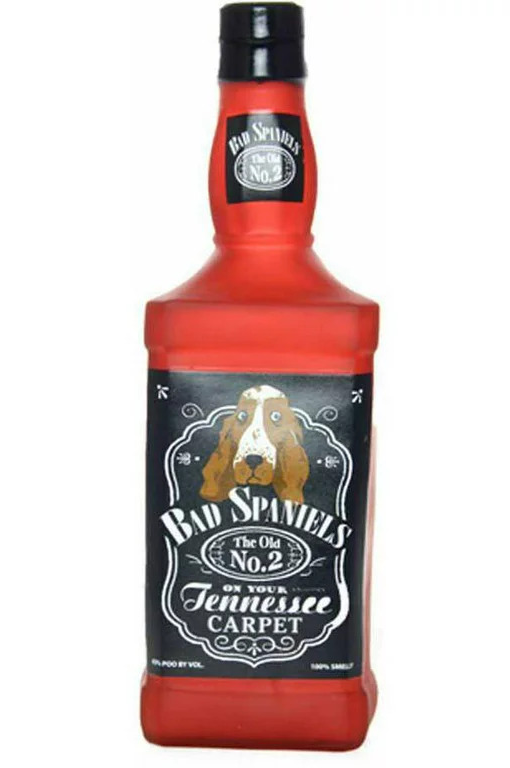by Audrey Jung
This Thursday, June 8, the Supreme Court ruled in Jack Daniel’s Properties, Inc. v. VIP Products LLC, siding unanimously with the whiskey brand in a trademark dispute over a chewable dog toy.
Through its line “Silly Squeakers,” pet product company VIP Products designs toys that parody popular beverage brands from Dos Equis (Dos Perros) to Stella Artois (Smella Arpaw). In 2014, the company set its sights on Jack Daniel’s with the roll-out of Bad Spaniels. The original and parody are depicted below.


To note a few of VIP Products’ tweaks, the company replaced “Old No. 7 Tennessee Sour Mash Whiskey” with “The Old No. 2 On Your Tennessee Carpet,” perched a doleful spaniel over the previously unencumbered white filigree, and concocted “40% alc. by vol. (80 proof)” into “43% poo by vol.” and “100% smelly.” Quite a change.
These alterations may have elicited a few laughs, but not from Jack Daniel’s. The company sued for Bad Spaniels’ market removal, claiming it violated the Lanham Act, a centerpiece of federal trademark law. The statute bars trademark infringement, the creation of a mark likely to confuse, deceive, or cause customers to mistake it for one already in existence, and trademark dilution, any action that degrades a famous trademark’s reputation. Bad Spaniels, the whiskey company asserted, both diluted and infringed their trademark.
VIP Products countered that Bad Spaniels qualified as an “expressive work” which should receive special protection under the Rogers test. Originating from Rogers v. Grimaldi, a Second Circuit case in which actress and dancer Ginger Rogers sued (and failed) to remove her name from the film “Ginger and Fred,” the test allows certain artistic works to bypass the infringement challenge to protect their First Amendment interests. The company also claimed protection under Lanham’s “fair use” clause that protects parody, criticism, or commentary of another’s trademark.
Justice Elena Kagan, writing for the Court, rejected these arguments. She noted that the Rogers Test has been historically applied to trademarks used solely for expressive purposes and not as “source identifiers,” where a trademark –– fulfilling its more traditional purpose –– identifies the source of its product. To illustrate this point, Kagan cited a Janis Joplin song lyric in which the artist asks for a Mercedes Benz. In this instance, the reference is expressive, and not intended to credit the car manufacturer with the production of the song. The Bad Spaniels trademark, albeit expressing a humorous message, is clearly used as a brand referencing a source, and so it must be considered under the Lanham Act. But whether the trademark causes customers to confuse the product with Jack Daniel’s is left for lower courts to decide.
Further, the Court reaffirmed that the “fair use” exception is restricted to non-commercial products. In Kagan’s words, “However wide the scope of the “noncommercial use” exclusion, it cannot include…every parody or humorous commentary.” Trademarks employing a parody to designate the parodist’s own products can not fall under this umbrella.
The concurrences espoused caution. Justice Sonia Sotomayor, joined by Justice Samuel Alito, warned against ready reliance on survey data as evidence of customer confusion over trademarks, recommending a close assessment of “methodology and representativeness” first. Meanwhile, Justice Neil Gorsuch, with whom Justice Clarence Thomas and Justice Amy Coney Barrett concurred, expressed concern that Rogers is shaky doctrine.
As Justice Kagan iterated, the Court’s ruling is narrow, for “dog toys and whiskey [are] two items seldom appearing in the same sentence.” It’s back to the kennel for Bad Spaniels, but the fate of Rogers and other products remains in the air.